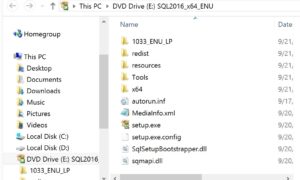32-Bit Server-based SQL Server Is Finally Dead
Some of you may have noticed that Microsoft recently released SQL Server 2016 CTP 2.4. There is one major change that I am very happy about – x86, or the 32-bit version, is no longer included. SQL Server 2016 is now 64-bit only. This is what you see in Windows Explorer:
This is one of those changes that has been a long time coming. I first blogged in 2009 about the beta release of Windows Server 2008 R2, and how it was 64-bit only. I’ve talked publicly how SQL Server was really the only major Microsoft server product left shipping a 32-bit version and how the SQL Server dev team needed to stop shipping an x86 version – especially since the last 32-bit Windows Server release was Windows Server 2008. I even entered a formal bug for SQL Server 2014. Now that SQL Server 2016 is officially not supported on that OS, it’s time to kill it – and it has finally happened.
Its removal is actually the result of an offline conversation I had with someone on the SQL Server development team earlier this year (that conversation covered other stuff which has not and probably will never be fixed … grumble). I’ve been lobbying for this to happen for quite some time (since Windows Server 2008 R2, actually). I pleaded my case yet again during that chat, and they said they would see what they could do – no promises. I did not hear anything for about half a year until an e-mail in June saying that 32-bit would officially be dropped, and was told a few weeks ago it would finally be in CTP 2.4. Lo and behold, no x86! I know it was hard work for the dev team to do, and I for one, thank them from the bottom of my heart. It’s been hard sitting on this one for all this time, but I’m glad I can finally talk about it. As the old saying goes, people really do win on MTV.
Another major reason to kill 32-bit would be so that the SQL Server development team could have more test coverage elsewhere, Think about it – for everything they test, it had to be done twice (x86, x64). Now it’s just once.
Does this mean there will be no 32-bit version of SQL Server 2016? They may make some desktop version; I don’t know nor have I been following. But as a Server product? RIP, and good riddance.
So you can thank (or damn) me for this one. Me, I’m going to celebrate. Where’s my bottle of Coca Cola with real sugar?


Pingback: Goodbye 32-Bit SQL | Curated SQL
Pingback: Ding, Dong - SQL Server's Dependency on .NET Framework 3.5x is Dead - SQLHA
thanks to god that I am going to receive the setup
Pingback: No 32-bit for SQL Server 2016 Express – The Ji Village News
I understand that the team no longer has to test the 32-bit version and probably the full version doesn’t need a 32-bit version but the express version should still come in the 32-bit flavor.
Why?
Anyone who is buying the full version probably has a dedicated 64-bi server (or two or three) and so won’t want a 32-bit version.
But there are many small businesses out there that still run 32-bit windows for various reasons – some because they still need to run 16-bit legacy Apps. Of course, all they need is one 64-buit machine to put SQL server on but they may only have one or two computers.
And, yes, you could say that 16-bit apps should be dead by now and that is true for large companies where they probably ARE already dead but small businesses have different needs and different budgets.
Glyn hit the nail on the head.
We have a 16 bit application that will likely never get updated, running alongside a HMI for power management. So we run Windows 10 32-bit. The migration of the HMI meant I needed to find a new way to create reports. It used to store files in a proprietary format, but I can now store it in an SQL Express database.
I thought great; SRRS + SQL Express will cover the reporting and datalogging for free.
But no 32-bit support?! That is bad news (for me at least)…
MS can’t support, nor should they, everything forever. 32-bit had its day. It’s on you that you need (for whatever reason) to support a 16-bit app which has to be at least 15, if not 20, years old now. I understand you have reasons; I work with customers all the time who have somewhat similar scenarios. But you need a plan to move forward, because the 16- and 32-bit train sailed.